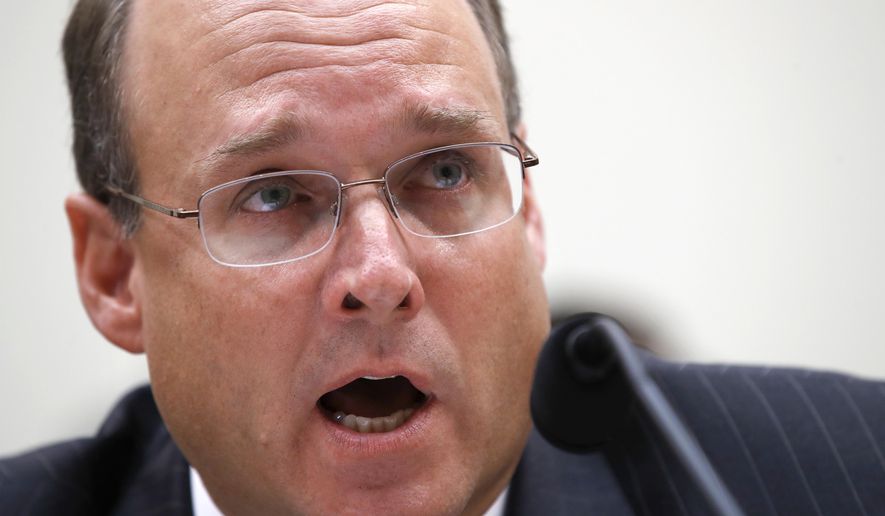China, as promised, was a no-show at a new round of nuclear arms talks between the United States and Russia in Vienna, even as Washington and Moscow agreed to hold further meetings to work toward a new arms control treaty.
Marshall Billingslea, special U.S. envoy for arms control, chided Beijing for failing to join the talks despite a formal invitation to the first talks on updating the expiring 2011 New START arms limitation treaty.
“China is a no-show,” Mr. Billingslea tweeted as the talks began. “Beijing still hiding behind #GreatWallofSecrecy on its crash nuclear build-up, and so many other things. We will proceed with #Russia, notwithstanding.” The U.S. side released a photograph of the meeting room showing empty seats with Chinese flags.
In Beijing, Chinese Foreign Ministry spokesman Zhao Lijian, denounced the U.S. effort to press Beijing into arms talks. China has long resisted being included in the New START talks, saying its nuclear warhead arsenal is small fraction of those of the U.S. and Russia.
“China has on many occasions stated its position on opposing trilateral negotiations of arms control,” Mr. Zhao said. “It is unserious, unprofessional and unappealing for the U.S. to try getting people’s eyes in this way.”
The U.S.-Russia talks ended Tuesday after a 10-hour, nonstop session involving senior generals from both sides.
Mr. Billingslea said the United States wants to broaden arms negotiations to include China’s nuclear arsenal, and to cover all types of nuclear weapons, not just strategic ones. The new approach will also seek to improve treaty verification measures.
“We, the United States, intend and believe … that the next arms control agreement must cover all nuclear weapons, not just so-called strategic nuclear weapons,” he told a news conference in Vienna.
Several technical working groups were established as a result of the talks, including task forces on space, tactical and low-yield warheads, and nuclear doctrine.
A U.S. official who briefed reporters on the talks said the Russians were provided a classified briefing on China’s crash nuclear buildup in a bid to convince Moscow to support adding China. A similar briefing is scheduled for NATO allies this week.
Russian President Vladimir Putin has proposed a simple five-year extension of the current new START pact, which expires in February, saying that would give the U.S. more time to try to persuade Beijing to participate.
China’s nuclear buildup includes large numbers of new missiles, most with multiple warheads, along with submarines and bombers as well as new hypersonic glide vehicles that can deliver warheads through missile defenses.
A second round of talks could be held in late July or early August.
The U.S. delegation included for the first time the deputy commander of the Strategic Command, Lt. Gen. Thomas A. Bussiere, along with Pentagon and Energy Department nuclear officials.
“We both agreed at the termination of our talks that the strategic environment has changed significantly since the New START treaty was signed [in 2010],” Mr. Billingslea said. “We can all remember back 10 years ago, the world is, in fact, a radically different place.”
The United States regards the treaty has outdated in not including China and because it has failed to constrain Moscow’s nuclear arms buildup.
Russia is more than 70% complete with upgrading its arsenal and is building exotic weapons not covered by the New START treaty. They include a nuclear-powered cruise missile and a nuclear-tipped drone submarine.
In Moscow, Russian Deputy Foreign Minister Sergei Ryabkov, who led the Russian arms delegation, said the working groups were a positive step forward.
“We presented our view and will keep doing so,” he told Interfax agency. “We are running out of time.”
Mr. Billingslea said that all options on the future of the treaty are being explored. The United States, he said, is not engaged in an arms race but “we will not be left behind.”
“This is why a three-way nuclear arms control deal, in our view, has the best chance of avoiding an incredibly destabilizing three-way nuclear arms race,” he said.
The Russian side at the talks proposed expanding the concept of three-way talks to five-party negotiations, including Britain and France, but the U.S. opposed the idea.
“Both qualitatively and quantitatively, the United Kingdom and France are in a very different situation than the … Chinese,” Mr. Billingslea said.
Discussions during the talks also focused on Moscow’s recently announced doctrine that calls for using nuclear weapons in response to conventional missile attacks.
Both sides also talked about nuclear modernization plans.
The United States is building new missiles, bombers and submarines as part of a multibillion dollar, multiyear modernization.
A U.S. official said the Russians understood from the Chinese nuclear briefing that the United States is focused on dealing with the China’s buildup and that the idea of including Beijing in a future agreement was not a political ploy.
U.S. officials argue that one troubling sign for the Russians is that many of the new nuclear missiles being developed by the Chinese appear aimed at a future conflict with Russia. The Chinese briefing included information on how the People’s Liberation Army is rapidly moving toward a triad of nuclear forces — missiles, submarines and bombers, described by the official as a troubling evolution.
Moscow also sought to restore the 1987 Intermediate-range Nuclear Forces Treaty that the United States abandoned over what U.S. officials say was Russia’s deployment of a new cruise missiles, the SSC-8, that is banned by the treaty.
• Bill Gertz can be reached at bgertz@washingtontimes.com.




Please read our comment policy before commenting.